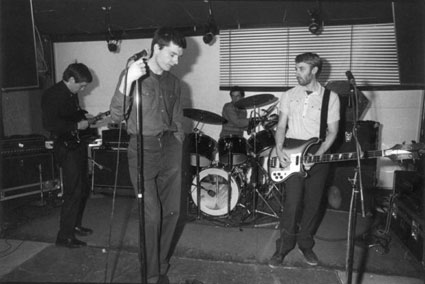 IF small-time label boss and TV personality Tony Wilson had been a more skittish and easily frightened man, the world may have been deprived of some of the most important music of the past 40 years.
IF small-time label boss and TV personality Tony Wilson had been a more skittish and easily frightened man, the world may have been deprived of some of the most important music of the past 40 years.
As opposed to the glad-handing and boot-licking that’s commonplace in today’s music industry, a young Ian Curtis grabbed the head of Factory Records’ attention via an extremely different method.
Wilson; who was the host of regional programme ‘Granada Reports’ and struck an unconventional balance between traditional TV reporter and fanatical music aficionado, received a letter from the now mythologised figure which pulled no punches and made some very explicit demands.
Riddled with insults and other defamatory comments, Curtis declared Wilson to be nothing short of a ‘bastard’ for overlooking his band and not granting Joy Division a slot on his TV show. In a surprising turn of events, he took the message on board with haste and the Manchester four piece that would revolutionise post punk soon made their incendiary television debut.
‘”Seeing as how this is the programme which previously brought you the first television appearances from everyone from the Beatles to the Buzzcocks”, declared Wilson as he introduced the stoic gentlemen in drab, practical clothing, “we do like to keep our hand in and keep you informed of the most interesting new sounds in the north west. This, Joy Division, is the most interesting new sound we’ve come across in the last six months.”
What Wilson couldn’t have possibly known is just how much of an understatement this would prove to be. Rather than being a faddy band that would recede back the shadows from whence they came, the group that he would soon expend his own blood to sign to his label have became a standard bearer for all of those that hope to re-sculpt popular culture in their own image.
Initially designed as a club night which would highlight the brightest talents in Manchester and the surrounding area, Factory Records would burst forth from an industrial and economic wasteland to influence the world’s trendsetters and the generations of young idealists that would follow.
While their roster boasted a slew of impressive names including A Certain Ratio, The Durutti Column and the soon-to-be massive OMD, none of their recording artists have resonated with the public to the same extent that Joy Division have. Dwarfing the success of their peers by leaps and bounds, this is not the product of coincidence but as a direct result of the band and the Factory team’s subversive manifesto. Formed in the wake of The Sex Pistols’ landmark show at Manchester’s Lesser Free Trade Hall, the band were initially known as Warsaw but soon re-branded themselves with the then controversial name of Joy Division. As was suitable for a band named after the sex slavery wing of Nazi concentration camps, the onset of their new moniker heralded the emergence of an equally radical new sound that shook off the technical constraints of punk for a dynamic, highly strung and deeply original take on the genre’s fast paced foundations.
The embryonic days of punk were the product of animalistic aggression and political disenfranchisement, a reactionary impulse that eventually led the charge against the hardships which the youth were facing and acted as a guitar fuelled news bulletin. Where Joy Division expanded on this formula lies in their willingness to open the doors to contemplation and ruminations on life itself, creating songs which incited the body’s most base instincts while also providing a platform for the cathartic, challenging lyricism of their tormented and misunderstood frontman.
In addition to the band themselves, the madcap talents of the enigmatic Martin Hannett cannot be discredited when discussing the intertwined legacy of Factory and Joy Division. Known for his unconventional methods and unwavering belief in experimentalism, it is difficult to comprehend how immeasurably different Unknown Pleasures or Closer would have been if helmed by anyone else. Completely willing to anger the brash Peter Hook or befuddle the equally temperamental Bernard Sumner, Hannett’s cryptic instructions and peculiar schemes may have displeased some members of Joy Division (with Sumner going as far as to say they ‘resented’ the sound of their debut album) but they proved to be among the key attributes which separated the outfit from the crowd. The stark, abrasive and malignant world which lurched out from the music and into reality has been emulated or copied with varying results by everyone from Interpol to The Horrors but no one has ever managed to replicate the exact chemistry that Hannett and co struck upon no matter how hard they may try.
As album costs began to spiral, most labels would’ve made a concerted effort to reign in the group’s ambitions for the records or attempt to cut corners but this is where Factory emphatically stood their ground and separated themselves from the more timid, financially driven labels of the day. In the wake of the release of Unknown Pleasures, Curtis was the first to praise the label’s unfaltering faith in their artistic direction and stated that “We don’t want to get diluted, really, and by staying at Factory at the moment we’re free to do what we want.
There’s no-one restricting us or the music – or even the artwork and promotion.”
This is vastly different to the tact that other companies may have taken with such a potentially divisive band, with one example being RCA’s attempt to coerce the band into a very uncharacteristic cover of NF Porter’s northern soul classic ‘Keep On Keepin’ On’ during ill-fated sessions prior to their deal with Factory. Even in the wake of Ian Curtis’ death and the looming threat of a public outcry over the posthumously released Closer’s previously finalised image of a crypt on the album cover, they refused to infringe upon any aspect of the band’s process and allowed them to flourish on their own accord. This trend would carry on as Joy Division evolved into New Order when the label willingly lost 5p on every one of Blue Monday’s elaborate floppy disk sleeves, nullifying any profit that they could’ve made from the surprise new wave classic that it would become.
Ultimately, this is the lesson that both today’s musicians and labels should take from the story of Manchester’s trailblazing record company and their most equally innovative band. Factory’s lack of intervention into Joy Division’s art ensured that the finished product’s power was untainted and free from any concerns other than whether what had been conceived in their hive-mind had made it onto the first pressing and beyond. When you throw caution to the wind and let the artist’s vision come to life before your eyes, there’s no telling what a ragtag bunch of like-minded people from a harsh and industrialised city can do.








